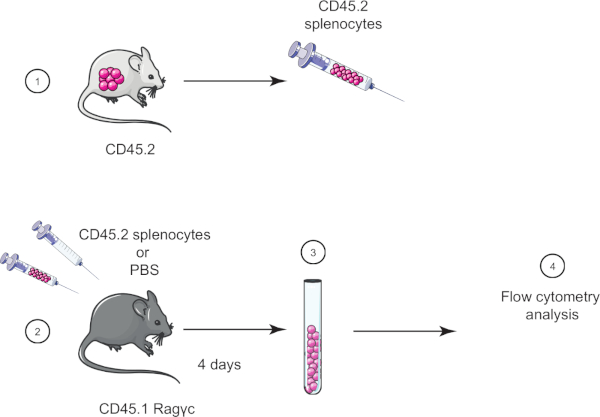Transferência de células adotivas: introduzindo esplenócitos de camundongos doadores para um camundongo hospedeiro e avaliando o sucesso via FACS
Visão Geral
Fonte: Meunier Sylvain1,2,3, Perchet Thibaut1,2,3, Sophie Novault4, Rachel Golub1,2,3
1 Unidade de Linfopose, Departamento de Imunologia, Instituto Pasteur, Paris, França
2 INSERM U1223, Paris, França
3 Université Paris Diderot, Sorbonne Paris Cité, Cellule Pasteur, Paris, França
4 Flow Cytometry Platfrom, Cytometry and Biomarkers UtechS, Center for Translational Science, Pasteur Institute, Paris, França
A transferência de células adotivas é um método para introduzir células em um paciente ou organismo de estudo, a fim de tratar uma doença ou estudar um processo biológico, como a hematose. Os objetivos da transferência adotiva são diversos; pode ser usado em biologia fundamental, bem como em ciências médicas (1, 2). Nos modelos de camundongos, a migração e distribuição de células transferidas pode ser estudada e seguida por um sistema de rastreamento (marcador de superfície celular, coloração por CFSE, etc.). Em estudos sobre câncer em modelos de camundongos, a transferência de populações celulares específicas pode ser usada como tratamento experimental contra tumores. Outro exemplo para esta técnica é a criação de camundongos quiméricos por transferência de células de medula óssea para camundongos irradiados ou camundongos com um fenótipo de imunodeficiência grave. Este modelo de mouse pode ser usado para avaliar o impacto da exclusão genética em uma população celular específica, por exemplo. A transferência de células emprestadas ósseas também é usada no tratamento médico humano. Quando os pacientes são irradiados em caso de terapia contra o câncer, a transferência adotiva da medula óssea permite a reconstituição do sistema imunológico.
O primeiro passo dessa técnica é obter a população celular de interesse. A técnica escolhida para isolar essa população depende do nível de especificidade da população-alvo. O maior nível de seleção é todo o órgão, no qual todas as populações celulares presentes no órgão são tomadas. Um método mais preciso é a seleção de uma população celular alvo, muitas vezes selecionada por um marcador de superfície celular. O método ideal para classificar as células neste caso é por classificação magnética. Finalmente, o nível mais rigoroso é a seleção de células por vários marcadores de superfície celular para classificar populações celulares muito específicas. A classificação da citometria de fluxo é o método mais popular para este nível de seleção. Uma vez que a população de interesse é obtida, ela pode ser transferida para o hospedeiro. Antes da transferência adotiva é essencial garantir a compatibilidade entre o hospedeiro e o doador. De fato, independentemente do objetivo de transferência, a compatibilidade é crucial para garantir a adoção de células pelo hospedeiro sem rejeição celular.
Neste exercício de laboratório, demonstramos a técnica de transferência celular adotiva transferindo esplenócitos de um rato CD45.2 para um rato RAGΓC CD45.1 (sem linfócitos) e quatro dias depois confirmamos a transferência de esplenócitos usando citometria de fluxo (ver Figura 1).

Figura 1: Representação esquemática da transferência adotiva. (1) Os esplenócitos são isolados de camundongos CD45.2 e (2) transferidos em mouse CD45.1 Ragγc, o mouse de controle é injetado apenas com PBS. (3) 4 dias após a transferência adotiva, os esplenócitos são recuperados de camundongos e (4) analisados por citometria de fluxo. Clique aqui para ver uma versão maior desta figura.
Procedimento
1. Preparação
- Antes de começar, coloque luvas de laboratório e as roupas de proteção apropriadas.
- Esterilize todas as ferramentas de dissecção, primeiro com um detergente e depois com 70% de etanol e depois seque bem.
- Prepare 50 mL da solução de sal balanceada da Hank (HBSS) contendo 2% de soro fetal de bezerro (FCS).
2. Dissecção
- Usando um sistema de entrega de dióxido de carbono, eutanize o rato por hipóxia. Fixa
Resultados
Os camundongos ragγc têm uma composição alterada do sistema imunológico, principalmente sem linfócitos. A transferência adotiva de esplenócitos permite a introdução de populações carentes, como células T e B. Nossa coloração incluiu marcadores de superfície celular CD45.1 e CD45.2 para distinguir células hospedeiras edoadoras, respectivamente( Figura 2A). Também incluiu outros marcadores de superfície celular para destacar ...
Aplicação e Resumo
Transferência adotiva é uma técnica translacional em diferentes campos da ciência, com aplicações na medicina. Essa técnica pode ser usada para estudar migração celular e tropismo ou incidência de deficiência de proteínas em populações celulares específicas. No último caso, diferentes tecnologias podem ser usadas, especialmente camundongos transgênicos, onde populações de células específicas são intrinsecamente deficientes. No entanto, a construção genética para obter camundongos transgênicos po...
Referências
- Restifo, N. P., Dudley, M. E. and Rosenberg., S. A. Adoptive immunotherapy for cancer: harnessing the T cell response. Nature reviews. Immunology, 12 (4): 269-281, (2012).
- Bonini, C., and Mondino, A. Adoptive T-cell therapy for cancer: The era of engineered T cells. European journal of immunology, 45 (9): 2457-69, (2015).
Pular para...
Vídeos desta coleção:

Now Playing
Transferência de células adotivas: introduzindo esplenócitos de camundongos doadores para um camundongo hospedeiro e avaliando o sucesso via FACS
Immunology
22.3K Visualizações

Citometria de Fluxo e Separação de Células Ativadas por Fluorescência (FACS): Isolamento de Linfócitos B Esplênicos
Immunology
92.9K Visualizações

Seleção de Células Ativadas por Magnetismo (MACS): Isolamento de Linfócitos T Tímicos
Immunology
22.9K Visualizações

Ensaios ELISA: Indireto, Sanduíche e Competitivo
Immunology
238.2K Visualizações

Ensaio ELISPOT: Detecção de Esplenócitos Secretores de IFN-γ
Immunology
28.5K Visualizações

Imunohistoquímica e imunocitoquímica: imageamento de tecidos via microscopia de luz
Immunology
78.8K Visualizações

Geração de anticorpos: produzindo anticorpos monoclonais usando hibridomas
Immunology
43.5K Visualizações

Microscopia de imunofluorescência: Coloração por imunofluorescência de secções de tecido embebidos em parafina
Immunology
53.8K Visualizações

Microscopia confocal de fluorescência: uma técnica para determinar a localização de proteínas em fibroblastos de camundongos
Immunology
43.1K Visualizações

Técnicas Baseadas em Imunoprecipitação: Purificação de Proteínas Endógenas Usando Esferas de Agarose
Immunology
87.7K Visualizações

Análise do Ciclo Celular: Avaliação da Proliferação de Células T CD4 e CD8 Após Estimulação Usando Coloração CFSE e Citometria de Fluxo
Immunology
24.2K Visualizações

Ensaio para Morte Celular: Ensaio de Liberação de Cromo para Avaliar a Capacidade Citotóxica
Immunology
151.4K Visualizações
Copyright © 2025 MyJoVE Corporation. Todos os direitos reservados